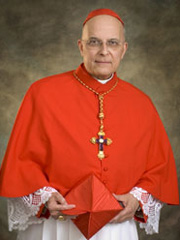Several weeks ago, Cardinal Francis George of Chicago made comments comparing gays to members of the Ku Klux Klan. He later revised that statement to comparing gay marches to Klan marches in neighborhoods where they were unwelcome.
Really? Gays are unwelcome in Boystown in Chicago or Oak Lawn in Dallas?
Our friends at New Ways Ministries, a Catholic organization working for gay and lesbian equality within the Catholic Church, sent us an update with an apology by the Cardinal.
During a recent TV interview, speaking about this year’s Gay Pride Parade, I used an analogy that is inflammatory.
I am personally distressed that what I said has been taken to mean that I believe all gays and lesbians are like members of the Klan. I do not believe that; it is obviously not true. Many people have friends and family members who are gay or lesbian, as have I. We love them; they are part of our lives, part of who we are. I am deeply sorry for the hurt that my remarks have brought to the hearts of gays and lesbians and their families.
I can only say that my remarks were motivated by fear for the Church’s liberty. This is a larger topic that cannot be explored in this expression of personal sorrow and sympathy for those who were wounded by what I said.
Francis Cardinal George, OMI
Francis DeBernardo, executive director of New Ways Ministries, wrote, “The significance of this action is immense. For the first time that I can remember, a prelate has acknowledged that words and ideas he has used in regard to the LGBT community were harmful, and he has apologized for the hurt they caused.”
He went on to suggest that if the cardinal is truly sorry, he could meet “parade-goers in front of Our Lady of Mount Carmel church on the day of the parade, and pass out water to them.”
In an update to the apology, DeBernardo published a comment the cardinal made to the local press.
“George said although church teaching does not judge same-sex relationships as morally acceptable, it does encourage the faithful to ‘respect everyone,’” DeBernardo wrote.
He wrote that he hoped the apology was “the first step toward greater reconciliation between the LGBT community and the Catholic hierarchy.”

















Anyone who wear white billlowy lace as cuffs should keep their holy trap shut.